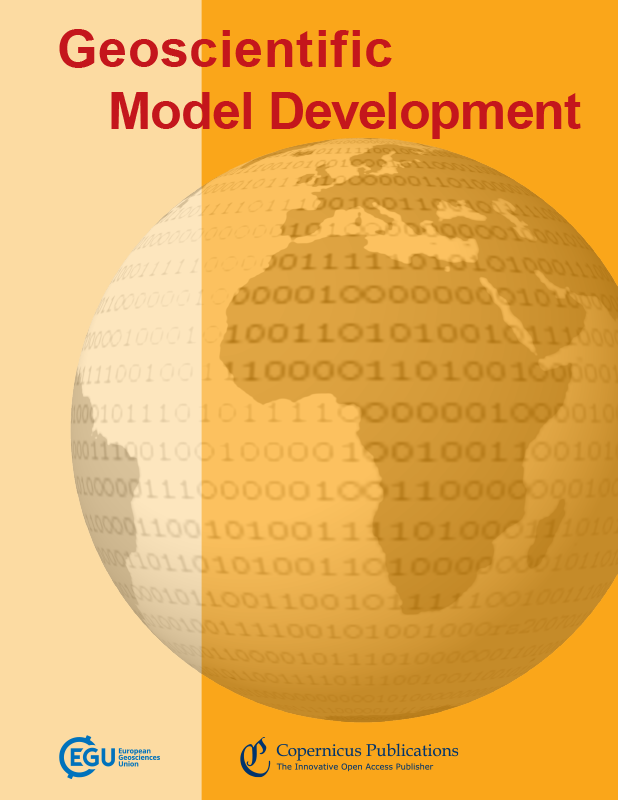拉格朗日输运模拟中火山二氧化硫耗竭的改进表示:MPTRAC v2.4的案例研究
IF 4.9
3区 地球科学
Q1 GEOSCIENCES, MULTIDISCIPLINARY
引用次数: 3
摘要
摘要二氧化硫(SO2)在地球大气中的寿命从几小时到几周不等,主要取决于云水是否存在。2018年7月瓦努阿图Ambae岛火山喷发,将大量SO2注入对流层上层和平流层下层(UT/LS)云量丰富的区域。因此,云内去除预计将在SO2的远距离传输和分散中发挥重要作用。为了更好地反映大气红外探测器(AIRS)和对流层监测仪器(TROPOMI)在拉格朗日输运模拟中观测到的SO2的快速衰变过程,我们考虑了气相羟基(OH)化学、水相过氧化氢(H2O2)化学、湿沉积和对流等因素,以比以往更真实的方式模拟了SO2的衰变。新开发或改进的化学和物理模块在拉格朗日输运模型大规模平行轨迹计算(MPTRAC)中实施,并在2018年7月Ambae火山喷发的案例研究中进行了测试。为了获得二氧化硫寿命对复杂大气条件的依赖关系,通过调整控制参数进行敏感性测试,例如,通过改变释放高度、预定义的OH气候学数据、云pH值、云量和其他变量。湿沉积和水相H2O2氧化显著增加了SO2总质量的衰减速率,导致Ambae羽流的快速和更真实的枯竭。本文描述的化学和物理SO2损失过程的改进表示有望在未来的工作中使用MPTRAC进行更真实的火山喷发事件拉格朗日输运模拟。本文章由计算机程序翻译,如有差异,请以英文原文为准。
Improved representation of volcanic sulfur dioxide depletion in Lagrangian transport simulations: a case study with MPTRAC v2.4
Abstract. The lifetime of sulfur dioxide (SO2) in the Earth's atmosphere varies from orders of hours to weeks, mainly depending on whether cloud water is present or not. The volcanic eruption on Ambae Island, Vanuatu, in July 2018 injected a large amount of SO2 into the upper troposphere and lower stratosphere (UT/LS) region with abundant cloud cover. In-cloud removal is therefore expected to play an important role during long-range transport and dispersion of SO2. In order to better represent the rapid decay processes of SO2 observed by the Atmospheric Infrared Sounder (AIRS) and the TROPOspheric Monitoring Instrument (TROPOMI) in Lagrangian transport simulations, we simulate the SO2 decay in a more realistic manner compared to our earlier work, considering gas-phase hydroxyl (OH) chemistry, aqueous-phase hydrogen peroxide (H2O2) chemistry, wet deposition, and convection. The either newly developed or improved chemical and physical modules are implemented in the Lagrangian transport model Massive-Parallel Trajectory Calculations (MPTRAC) and tested in a case study for the July 2018 Ambae eruption. To access the dependencies of the SO2 lifetime on the complex atmospheric conditions, sensitivity tests are conducted by tuning the control parameters, e.g., by changing the release height, the predefined OH climatology data, the cloud pH value, the cloud cover, and other variables. Wet deposition and aqueous-phase H2O2 oxidation remarkably increased the decay rate of the SO2 total mass, which leads to a rapid and more realistic depletion of the Ambae plume. The improved representation of chemical and physical SO2 loss processes described here is expected to lead to more realistic Lagrangian transport simulations of volcanic eruption events with MPTRAC in future work.
求助全文
通过发布文献求助,成功后即可免费获取论文全文。
去求助
来源期刊

Geoscientific Model Development
GEOSCIENCES, MULTIDISCIPLINARY-
CiteScore
8.60
自引率
9.80%
发文量
352
审稿时长
6-12 weeks
期刊介绍:
Geoscientific Model Development (GMD) is an international scientific journal dedicated to the publication and public discussion of the description, development, and evaluation of numerical models of the Earth system and its components. The following manuscript types can be considered for peer-reviewed publication:
* geoscientific model descriptions, from statistical models to box models to GCMs;
* development and technical papers, describing developments such as new parameterizations or technical aspects of running models such as the reproducibility of results;
* new methods for assessment of models, including work on developing new metrics for assessing model performance and novel ways of comparing model results with observational data;
* papers describing new standard experiments for assessing model performance or novel ways of comparing model results with observational data;
* model experiment descriptions, including experimental details and project protocols;
* full evaluations of previously published models.
 求助内容:
求助内容: 应助结果提醒方式:
应助结果提醒方式:


